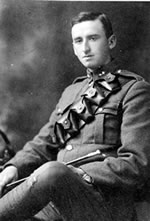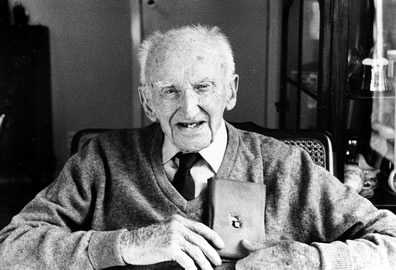Bertram (Bert) Oliver Stokes was born in Christchurch in 1896. Before going to war he worked as a junior clerk in an engineering firm. He left New Zealand in 1916 and served in the New Zealand Field Artillery as a gunner. He saw action in France and Belgium.
Hear Bert describe his experiences at Passchendaele at the time of the October 1917 offensive.
Transcripts
These extracts of oral history have been edited to facilitate reading / listening.
Passchendaele – mud and ration carts
(It was) still very cold and wet and muddy. And our ration carts could only get up at very very rare intervals and it was, in fact, impossible for us to go down any distance to meet the ration cart because the area was being shelled so heavily. And you could only go down on duckboards, and if you went off the duckboard you just went into a sea of mud. In fact, a lot of our men were more or less drowned in the mud at Passchendaele.
Getting out of Passchendaele
The day we came out from Passchendaele from the guns, I think that was the day that I was most scared of all … I mean throughout the war you didn’t sort of … well, I didn’t, and lots of others didn’t either, anticipate being killed … You didn’t think about it. When you saw chaps killed, well you sort of felt well, you know, this is the war. But the day we came out of Passchendaele we had to come down the duck walk and the Germans knew this duck walk and they used to shell it quite heavily. And I remember when we left the guns we ran as best we could down this duckboard, and in some places the duckboard was broken and you had to get through the mud on to the next part. We were so anxious to get out of the place that we ran most of the distance until we sort of felt we were out of range and then I remember we stayed the night in an old shed that we found, an old barn that was – that was round about there – slept the night there, then went back to the battery.
Pioneer Battalion at Passchendaele
We only had four guns in action at Passchendaele at the start and then they made an effort to bring in the other two guns. Well, they put in an eight-horse team instead of a six-horse team to try and bring it in, but the horses just got up to their bellies in mud and they couldn’t get through. But a party of about 40 Maoris arrived. See, the Maoris were a Pioneer Battalion. They didn’t fight. They were just a labouring battalion, and the party of about 40 Maoris arrived and there were about 20 of these Maoris on ropes on the axles of the guns and, as Maoris do, they performed a bit of a haka or something and pulled the gun right in. We thought that was wonderful.
The Battle of Gravenstafel – Ypres – early October 1917
(text only)
We had to take ammunition by pack horses … it was just that time that the rains set in and the salient of Ypres … was just one big swamp, shell holes, mud, slush, water in the shell holes and so on … and sometimes (the horses) would get into shell holes and you’d have the devil of a job getting them out … We used to leave the wagon lines about 6 o’clock and get back to the lines again about 11 o’clock at night and we’d sleep on the ground under bivvy sheets. And then in the morning we’d have to set to and clean all the harness because the harness would be in a terrible mess and the horses too would have to be groomed. Of course at this stage to lose a horse was worse than losing a man because after all, men were replaceable while horses weren’t at that stage.

Gunner Bert Stokes.

Bert Stokes aged 92.

Community contributions